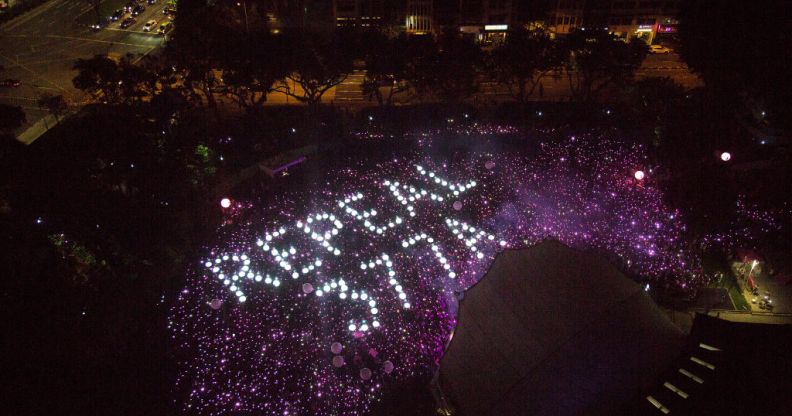Fresh battle to decriminalise gay sex launched in Singapore

Ore Huiying/Getty
A gay rights activist in Singapore has filed a new legal challenge against the country’s colonial-era ban on gay sex.
Roy Tan’s new legal bid is the third recent attempt to change the law.
Efforts to overthrow the law – known as Section 377A – have stepped up in recent months since the same colonial-era law was overturned in India last year.
Tan, who is a 61-year-old retired medical doctor, is asking that the law be overturned on the basis that it is unconstitutional.
Gay sex ban has ‘no place’ in Singapore.
“I am eager to see this archaic law, which has no place in modern society, struck down,” Tan said in a statement to AFP.
“By institutionalising discrimination, it alienates them from having a sense of belonging and purposeful place in our society, and prevents them from taking pride in Singapore’s achievements.”
Tan said the law means that gay people can be left feeling isolated and can cause mental health issues – and said it encourages negative media representation of LGBT+ people.
In 2014, Singapore’s Court of Appeal ruled that the archaic law was constitutional and said it was parliament’s responsibility to overturn it. Tan will try to prove that the court made a mistake in that ruling.
I am eager to see this archaic law, which has no place in modern society, struck down.
He is represented by M. Ravi, who represented one of the complainants in the 2014 appeal.
The law faced another challenge in January of this year from LGBT+ rights campaigner Bryan Choong. He filed a complaint in Singapore’s Supreme Court and argued that the law was unconstitutional.
The law states that a man who “commits, or abets the commission of, or procures… any act of gross indecency with another male person” can be imprisoned for up to two years. Despite this, the law is not strictly enforced.
Singaporeans have mixed feelings on decriminalisation
Recent polling on gay rights in Singapore suggest that the state’s residents have mixed views on decriminalisation.
An Ipsos Public Affairs poll from September 2018 found that 55 percent of Singaporeans support Section 377A. Just 12 percent said they wanted it repealed, however 33 percent were undecided.
Meanwhile, 28 percent of those polled said Singaporeans should be allowed to participate in same-sex relationships, with 38 percent opposed.
A majority of people aged under-24 in Singapore said people should be allowed to have same-sex relationships.

